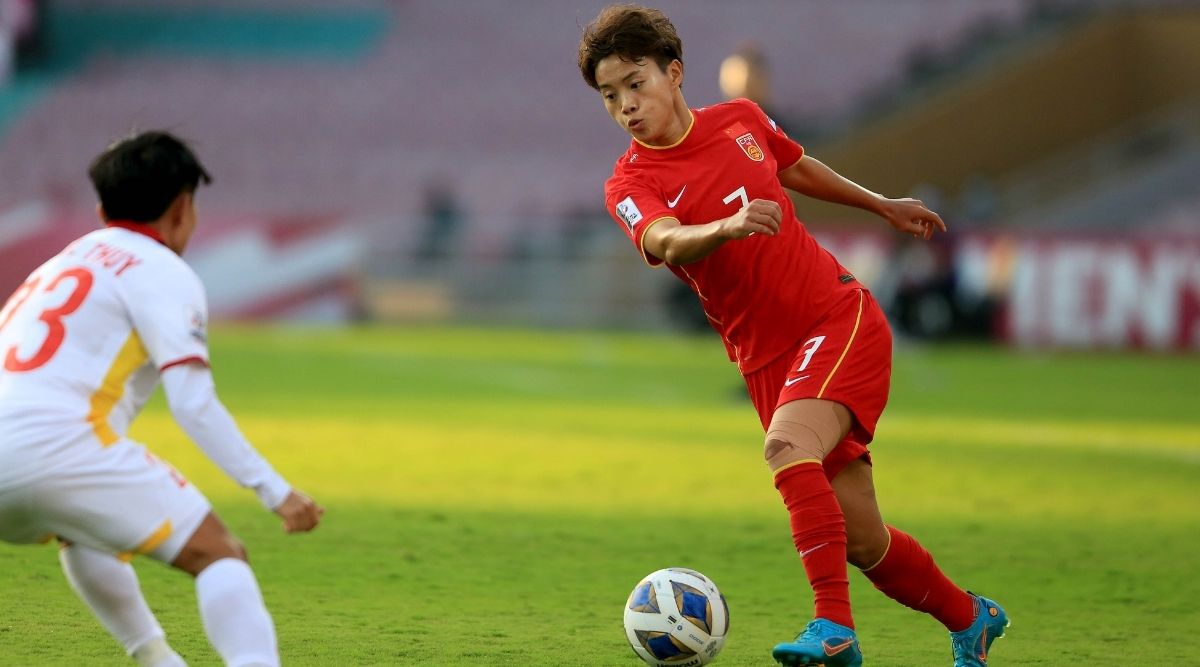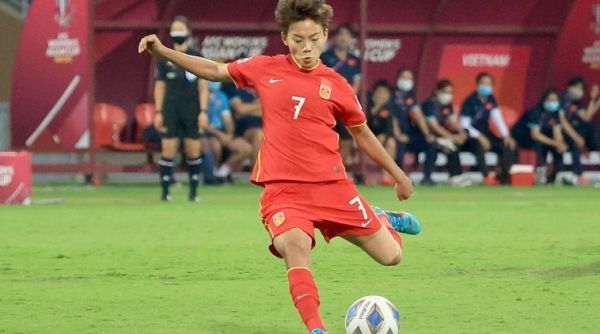 With five goals, China's Wang Shuang is the tournament's second-highest scorer. (Image Courtesy: Amit Chakravarty)
With five goals, China's Wang Shuang is the tournament's second-highest scorer. (Image Courtesy: Amit Chakravarty) Growing up, Wang Shuang felt like an imposter. Talk to her teammates, however, and they say she’s an inspiration.
Somewhere in between lies the compelling story of the biggest name in Chinese football and the 2018 AFC Asian Player of the Year. Abandoned by her parents, raised by her uncle and aunt, played football to overcome loneliness, secured a historic move to French powerhouse Paris St Germain, got separated from the rest of the Chinese national team players for 77 days when Wuhan, her hometown, was locked down at the start of the Covid-19 pandemic and, has now brought Asian football’s fallen giants to within touching distance of reclaiming lost glory.
On Thursday, China will face their toughest test of their Asian Cup campaign so far. Japan, powered on by Mana Iwabuchi – regarded as one of the best players in the world – will start as favourites in the semifinals in Pune. But in Wang, China have a player who can almost single-handedly control the narrative.
Like she did last Sunday. When Vietnam, one of the continent’s rising powers, gave China an early scare in the quarterfinals, Wang took the game by the scruff of the neck and bailed out her side. The 26-year-old midfielder was involved in all three of China’s goals – scoring one and providing two assists – in the 3-1 comeback win.
“She is a very good (role) model for us to learn from,” China captain Wang Shanshan, six years her senior who scored from her assist on Sunday, says. The ‘Steel Roses’ coach Shui Qingxia adds: “She is very courageous, very confident.”
‘Role model’, ‘courageous’ and ‘confident’ aren’t the attributes Wang has always associated with herself. By her own admission, lonely, shy, under-confident perhaps defined her better. At least, early on in life.
Wang was just five when her parents, after getting divorced, dropped her at a relative’s place and left Wuhan to restart their lives in different cities. She relived the trauma of being cast aside in a moving piece for the website The Players’ Tribune, recalling the several nights she locked herself in a room, crying and feeling vulnerable.
Having a ball
Football, as it so often is, became an escape. Wang started playing because her cousin – Cao Guodong, now a professional footballer himself – did. And soon, she’d sense the sport’s transformative power. Football allowed her to ‘express’ herself, make new friends and also realise that ‘no matter what happens, you are not alone’.
What began as a distraction became her destiny.
At seven, she was spotted by the coach of her brother’s team. By the time she turned 12, Wang was selected for China’s under-17 national team. At 16, she was selected for the under-20 side. A year later, she made her senior debut.
None of it, however, was smooth sailing. The constant jibes – being called ‘tomboy’ by teachers and ‘parents’ (her uncle and aunt), and by people who, she noted, ‘always tried to push me down, to crush my hopes, to tell me everything that I couldn’t do’ – affected her so deeply that she lost faith in her abilities. “They were saying that I had no talent for football at all. After a while, I felt almost as if I didn’t,” Wang wrote in her column.
When she was first called up to the national team, aged 17, Wang thought, “Me? Are you sure?”
 China’s Wang Shuang in action. (Image Courtesy: Amit Chakravarty)
China’s Wang Shuang in action. (Image Courtesy: Amit Chakravarty) When a South Korean club, Daejeon Sportstoto, wanted to sign her, she was ‘excited that a coach from another country thought I was good.’
It was only when Wang started juggling between three ‘jobs’ – playing for the senior national team, the youth national team, and her South Korean club, did she feel confident in her abilities. “I felt valuable. I felt recognised. Perhaps I had a bit of talent after all.”
Not any ‘bit of talent’; the child prodigy is hailed as China’s once-in-a-generation player, a status that got cemented when PSG signed her in 2019.
Climbing to the top again
China is one of the pioneers of women’s football in Asia and has won the continental championship eight times, including seven straight titles between 1986 and 1999. This was their golden phase, headlined by runners-up finishes at the 1996 Olympics and the 1999 World Cup.
Gradually, though, the dynasty declined. It’s been six years since China last won the Asian Cup, with Japan and Australia knocking them off the perch, and more than two decades since they achieved anything significant at the world level.
As the shy, under-confident teenager turned into a beast with unyielding self-confidence, it is hoped that Wang will inspire China to heights it once routinely scaled.
It was easy to gauge her importance to the side on the eve of the quarterfinals. Coaches almost always are hesitant to speak about individual players, often reminding that it’s the collective performance of the team that matters. But when coach Shui was asked about Wang ahead of the Vietnam match, she couldn’t stop waxing eloquent about her influence on the team, calling her an ‘outstanding’ player who unfailingly performed on the big stage.
Sunday provided an apt reminder. Rattled by the early goal, China turned to Wang, the tournament’s joint second-highest goalscorer, for inspiration. And she did not let her team down.
Whenever the Chinese players ran out of ideas, they’d simply pass the ball to Wang and she’d use her flair to create something. During build-ups, the versatile left-footed player moved fleetly on the wings, skipping past markers before smoothly cutting in with short, quick steps. When China lacked finishing, she provided it to score the equaliser; when they lacked a quality ball inside the box, she delivered two delightful assists that ultimately sealed the tie to set up the last-four clash against mighty Japan.
“I hope there are more and more players (in the Chinese team) like Wang Shuang who have the self-confidence to perform,” Shui says.
Not bad, for someone who has spent half her life feeling she’s an imposter.
Semifinal line-up
South Korea vs Philippines, 1.30 pm
China vs Japan, 7.30 pm
Live on Eurosport
- The Indian Express website has been rated GREEN for its credibility and trustworthiness by Newsguard, a global service that rates news sources for their journalistic standards.

